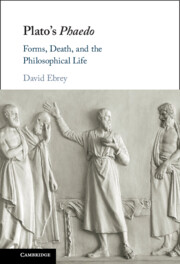Book contents
- Plato’s Phaedo
- Plato’s Phaedo
- Copyright page
- Dedication
- Contents
- Acknowledgments
- Introduction
- 1 The Characters
- 2 The Phaedo as an Alternative to Tragedy and Socrates as a Poet
- 3 Defense of the Desire to Be Dead
- 4 Cebes’ Challenge and the Cyclical Argument
- 5 The Recollecting Argument
- 6 The Kinship Argument
- 7 The Return to the Defense
- 8 Misology and the Soul as a harmonia
- 9 Socrates’ Autobiography
- 10 Cebes’ Objection and the Final Argument
- 11 The Cosmos and the Afterlife
- 12 The Death Scene
- Bibliography
- Index Locorum
- Index
8 - Misology and the Soul as a harmonia
84c–86e, 88c–95a
Published online by Cambridge University Press: 02 February 2023
- Plato’s Phaedo
- Plato’s Phaedo
- Copyright page
- Dedication
- Contents
- Acknowledgments
- Introduction
- 1 The Characters
- 2 The Phaedo as an Alternative to Tragedy and Socrates as a Poet
- 3 Defense of the Desire to Be Dead
- 4 Cebes’ Challenge and the Cyclical Argument
- 5 The Recollecting Argument
- 6 The Kinship Argument
- 7 The Return to the Defense
- 8 Misology and the Soul as a harmonia
- 9 Socrates’ Autobiography
- 10 Cebes’ Objection and the Final Argument
- 11 The Cosmos and the Afterlife
- 12 The Death Scene
- Bibliography
- Index Locorum
- Index
Summary
After the return to the defense, Simmias and Cebes raise objections to Socrates’ kinship argument, Socrates warns them to avoid misology, and then he responds to Simmias’ objection. These objections and this warning simultaneously serve as the climax of the first half of the dialogue and set the agenda for the second. I argue that misology is a more specific problem than it is typically taken to be, a problem that aspiring philosophers (like Socrates’ companions) are especially at risk of suffering, one that involves not merely becoming cynical about arguments but positively hating them. I then turn to Simmias’ objection and Socrates’ response to it. I argue that, as Socrates interprets Simmias’ theory that the soul is a harmonia, it makes the soul a properly fitted together composite, not the formal structure possessed by such a composite. This means that Socrates is not arguing against a type of supervenience theory or epiphenomenalism, as is frequently claimed. Socrates’ arguments against Simmias’ theory highlight how it cannot explain basic ethical features of the soul that the kinship argument’s account can explain.
- Type
- Chapter
- Information
- Plato's PhaedoForms, Death, and the Philosophical Life, pp. 184 - 206Publisher: Cambridge University PressPrint publication year: 2023

